Small-business partnerships usually develop in one of two ways.
One scenario occurs when two friends share energy, passion and an idea. They want to live the dream together, but they don’t have much money. The second scenario occurs when you have two partners: one with the money and one with the idea and the passion.
In both scenarios, partnerships rarely work. In over 20 years of counseling and coaching, Dave has discovered that the list of potential partnership breakdowns runs longer than Santa Claus’ list.
One partner almost always feels like he or she is carrying all the weight. And, usually, the other partner feels the same way. Both often think: I work harder; I’m smarter; my ideas are better; I bring more to the table. I’m more diligent and intelligent.
One may work 60 hours a week, while the other puts in 40 hours. But they both split the money. See how the tension can build? Maybe it sounds like a grand idea at first, but the novelty of the partnership wears off pretty quickly.
And that’s just the beginning of the drama. Even if the two partners get along fairly well, spouses can jump in and create friction in the business. Unforeseeable difficulties can also pop up and throw a serious wrench into the best of plans.
What if one of the partners gets seriously sick and can no longer contribute? What if one gets into financial trouble and there are liens against everything? What if one loses the passion? Then one has to buy the other out and put a value on everything up to that point.
Can you buy insurance against some of these things? Yes. But, honestly, it’s not worth the trouble.
Ready to Level Up Your Business?
Find out your Stage of Business with our free assessment and get additional resources to help you level up by focusing on the right things at the right time.
So what’s the alternative to a partnership? Depending on your situation, we might recommend a joint venture. This would basically make you the owners of two separate companies who are working under one legal entity. Joint ventures are much easier to manage than partnerships if you ever decide to part ways and do your own thing.
For instance, Sean recently called in to Dave’s radio show to discuss a potential partnership for his production company. He and his potential business partner had investors backing the whole deal.
Even in that situation, Dave still recommended a joint venture over a partnership. “If something happens and someone gets hurt or divorced, you don’t want to be in a partnership with the other guy’s wife,” he said. “If one of you bails, the other one needs to end up with it.”
Everyone believes it won’t happen to them. But now that you know the dirt on partnerships … beware! They almost always end, and they rarely end well.
Learn more from Dave about growing your business the right way at his business conference, EntreLeadership.


